- Home
- Tim LaHaye
Edge of Apocalypse Page 22
Edge of Apocalypse Read online
Page 22
Less than a minute later Judge Olivia Jenkins entered the courtroom, and the lawyers jumped to their feet.
The rest of the courtroom was empty. The government had secured an order from the judge clearing visitors and bystanders and barring the media on the grounds of national security.
Jenkins was an attractive, middle-aged black woman with a reputation as a smart, no-nonsense judge.
She glanced through the file and then called the case.
Harry Smythe strode up to the podium and offered his arguments. There were only two main points. First, that the RTS design belonged to Joshua Jordan, not the government. It was a matter of patent law and intellectual property rights. Congress had no right to force disclosure of weapon designs that were trade secrets and belonged to a private citizen. Besides, Smythe argued, Joshua Jordan had had no qualms about testifying to the select committee and he had answered all of their questions. The only "line in the sand" he drew was his refusal to produce highly sensitive documents for the design of the RTS weapon to members of Congress.
Judge Jenkins asked the assistant attorneys to weigh-in.
The first government lawyer was brusque. "The contract that the Pentagon had with Mr. Jordan states, Your Honor, that when the weapon was officially accepted by the United States, it would become the property of the United States. Mr. Jordan signed away any special rights he had to the RTS design--"
Harry Smythe shot back, "But the RTS system was still experimental. It was never officially accepted by the U.S. government--"
"You're wrong," the government attorney countered. "When the U.S. government used the RTS weapon to turn back incoming missiles--and used it, Your Honor, with Mr. Jordan's permission and participation, I might add--that was the same as 'accepting' the weapon for purposes of the contract."
Judge Jenkins made short work of that argument. "I'm not convinced," she said, "that Mr. Jordan retained any private rights to the RTS weapon design, at least as against the United States of America. He can protect his patent against other private citizens, but not against Congress, which is an arm of the U.S. government. Mr. Smythe, you've lost on that one."
Smythe then launched into his second point. That Joshua Jordan had a concern about the ability of the congressional committee to keep the RTS weapon design information secret.
"That committee had already leaked information to the press," Smythe said, losing his characteristic professional calm. His face was beginning to get flushed as he spoke with an angry passion. "How can we assume that it will not allow the leaking also of this sensitive weapons information?" he added.
"Mr. Smythe's argument concerns me as well," the judge said, motioning to the government lawyers to respond.
The second assistant attorney strode to the podium to address that point. "It seems to me that we could agree on steps to be taken that would ensure the super secrecy of this RTS information," he said. "Once Mr. Jordan discloses it, of course."
Judge Jenkins turned to look at Harry Smythe.
Harry had the premonition already what the judge was going to do. It was all too reasonable. Too practical a solution for the judge not to jump on it.
"Mr. Smythe, what do you say about that?" Judge Jenkins said. "We do confidentiality procedures all the time in contested subpoena cases. Have Mr. Jordan produce the documents to this court. I'll fashion some restrictions on the committee that hopefully they will agree to. Then everybody's happy, right?"
But Smythe knew somebody wouldn't be happy. He knew that Joshua Jordan had no intention of divulging his RTS design for the eventual use--or misuse--by a group of politicians.
Smythe braced himself as he began to share the bad news. "Your Honor, I doubt that your creative solution will work."
"And why is that?"
Harry was about to pull the pin in the hand grenade. "Because Mr. Jordan is not inclined to comply with the subpoena. He won't divulge his RTS technology. Except to the Defense Department under conditions where he has some guarantee that it won't be used for political purposes and that it won't be shared with other nations."
There was a different look now on Judge Jenkin's face. No longer the mediator, the conciliator looking for a compromise among the parties. Now it was the aggravated judge who had the power to level judgment.
"The government in their response papers says that Mr. Jordan is deliberately avoiding service of the subpoena. Is that true?"
"They have been unable to serve him, Your Honor..."
"That's not what I asked. Is your client willing to admit service on the subpoena?"
"No, Your Honor. He isn't."
"So Mr. Jordan is in defiance of Congress. He's defying an official subpoena. I wonder, Mr. Smythe, if he will also be in contemptuous defiance of this court?"
"Your Honor?"
"As you know, the government has asked me as part of this proceeding to issue an order that Mr. Jordan produce his RTS data, and failing that to be held in contempt of court, and to be sent to jail until he complies. If Mr. Jordan is ordered to produce his RTS documents to this court, are you saying that he will disobey my order?"
Smythe now had to do a quick legal tap dance.
"Your Honor, with all due respect, you are asking me to commit my client to a hypothetical future situation. The fact is that you haven't yet ordered my client to produce his RTS documents...we only have the congressional subpoena--"
"Well I'm ordering it now," the judge barked. "Your client has exactly forty-eight hours to turn over these documents to this court. Failing that, I will consider--and will probably order--his indefinite incarceration in a federal detention jail. You'd better tell your client he's in deep water right now. I hope he knows how to swim."
As soon as Harry Smythe pushed his way through the reporters milling around in the hallway outside the courtroom and yelled "no comment" to those peppering him with questions, he found a quiet corner.
He called Joshua.
"Josh, we've been shot down by the judge."
"Abby said we'd probably lose."
"The judge ordered you to produce your RTS documents within forty-eight hours."
"Or...?"
"Or federal marshals put out a warrant for your arrest. Then they haul you in for processing, take your mug shot, remove your personal effects for safe-keeping, and do a strip search. Then they put you in a jail cell."
"What's your next move?" Joshua asked coolly.
"Appeal it. But don't count on a favorable result. More important, Josh, what's your next move?"
"What I always do when enemy fire is incoming. Keep my head down and my finger on the trigger."
FORTY-FOUR
Part of her still couldn't believe it was happening.
Darlene Rice had settled in fairly well at the Living Waters Recovery Center in Tucson. From her vantage point, she felt as if she'd been making progress. The question now was whether the rehab specialist thought so too. Now Darlene was sitting across the desk from a female drug counselor named Margaret. It was her first review after having been at the center for several weeks. All of this still felt foreign to Darlene. One good thing, Darlene thought to herself, was that she really liked Margaret. She was kind but tough. A straight shooter.
Margaret looked up from a report, smiled, and began.
"We've finished the assessment. During the days you've been here we all think you've been very cooperative. In the end, you are the one who will be directing your own recovery. It may look like we're the ones in charge, but not really. A person has to understand they have an addiction, and then they have to want to get better. From our perspective, it looks to us like you do. That's a really good thing, Darley. We're very encouraged. You should be too."
Darlene smiled back, but she was shaking a little. She wanted to hide her hands, which hadn't stopped trembling since she'd been taken off her excessive prescription meds. Yet somehow she knew this was a place where it was okay. They would understand. Yes, she would have preferred that Abigail be there
to hold her hand. But then, maybe it was for the better. Darlene knew she had to learn how to walk the road to recovery from her addiction on her own.
Margaret continued, "We've got a picture now of your situation. I'd like to talk to you about the next steps. First, I noticed that your husband, Fortis--"
"We all call him Fort."
"Okay. Fort didn't come during visiting day yesterday. No big deal. People have busy schedules. But I just wanted to ask some more about him."
"Well, we talked in the interview already about Fort."
Margaret was nodding softly. But Darlene saw that she wasn't buying it. She liked Margaret. She had the wonderful knack of getting down to the truth of Darlene's drug addiction without making it too painful. In other words, she used anesthetic before doing emotional surgery. That was really important to Darlene. She thought, I've been using drugs to numb the anxiety and fear about so many things. Seeking comfort from pain whenever I could. After losing Jimmy I needed to escape from anything that hurt me. I know that now. But, what do I tell her about Fort...?
"So your husband..."
Darlene decided it was time to blurt it out, so she said, "Fort hasn't bought into this whole counseling thing. He's very traditional. A private man. He's not convinced I really have an addiction. He doesn't like the idea of a group program where people tell other people their problems. His attitude is--just stop taking the pills. Plus, there is the other thing..."
"Other thing?"
"The fact that this is a Christian drug rehab center. Oh, my, he really does have a problem with that." Darlene gave a little chuckle. "Fort says that 'too many people use God as the front man for all their problems.'"
"But you came here anyway?"
"Yes. My good friend Abby Jordan recommended it. I'm so glad she did. Abby is one of those 'glow-girl Christians.' That's what I call it. You know, they have an inner glow. Like the power light on your curling iron that lets you know it's hot and ready to go. Anyway, she's got a power inside that other people don't have. I'd love to have that."
"Well, we talked about that in the session last night, right?"
"Yeah, and I've been thinking a lot about what you said. It's a little like what Abby used to say to me. Even before she found out about my addiction. Not just solving a problem...but transformation. "
"And remember how that happens?"
"You said it was through the transforming power of Jesus Christ."
Margaret said, "Right. I was an addict myself. Jesus changed my life. Completely."
That is where Margaret stopped talking. She smiled, leaned back. For a moment no one said a word. Then Darlene, whose brow was wrinkled in thought, looked up and spoke.
"You know what? I want that too."
"You can."
"I don't know. I've felt so lost since Jimmy died. I don't even know how to begin."
"Just like there are steps to recovery, there are steps to getting right with God. First recognize that you--like all of us--are a sinner. Not a popular phrase anymore. Not politically correct. But eternally true. The Bible says, 'All have sinned and fallen short of the glory of God.'"
Darlene nodded vigorously. "Oh, I've blown it so many times. Sometimes, it feels like I just can't help myself..."
"Next, you need to understand that God loves you. He hasn't forsaken you. He's made a plan that can bring you into His family. His Word says that He loved the world so much that He gave His only begotten Son--Jesus Christ--that whoever believes in Him won't perish, but will have everlasting life."
"On the cross. Died for us..."
"Exactly. The only way our sins can be forgiven. Washed clean. Absolutely clean..."
"Cleaner than that extra strong stuff with bleach I use obsessively to clean my bathroom fixtures," Darlene said, and they both smiled.
"Cleaner than clean. But you have to do it God's way. Declare that Jesus Christ is the Son of God, that He died for your sins, that He rose from the grave three days later, just as the Bible says."
Darlene took a moment to be sure. She'd been thinking about this for a long while. After she talked to Abby for the first time about the change in her life. And then so many other times after that when they would talk about God and how things had changed for Abby. It was as if a wind had been at her back all of this time, pushing Darlene from behind. Moving her to this point.
"Yes. I believe all that," Darlene said. "I remember what Abby used to tell me. She used to ask me whether I was willing to invite Jesus Christ into my heart, to forgive my sins, and to change my life forever. I'd change the subject. I wasn't ready. But now I am. I want Jesus to be my Savior. I mean...personally. Not just some religious figure on a cross or in a picture. But to be real...I want to meet Him in my heart. I don't want to put this off any longer."
They both bowed their heads.
Just then, Darlene had the instinct to get down on her knees. So she did. Margaret followed her to the floor, sitting next to her, both of them resting their arms and hands on the couch.
"I am a sinner, God," Darlene said, with her eyes closed tight, her voice trembling. "No surprise there, right? You always knew that. And I know that. I believe your Son, Jesus, died on the cross for my sins. Then He walked out of the grave because, well, He had to, because He's the Son of God. Not a problem for God's Son to get that done. So, God, I want Jesus Christ to come into my heart. Please have Him come, God. I need Him to save me. Clean me up. Not just the pills. But everything..."
Her words were wavering and caught in her throat as she continued, "I want Jesus to be totally in charge. A changed life. Transformation. Please, God, I need this so badly..."
That's when the tears came and the words stopped.
Margaret put her arm around Darlene, whose shoulders were shuddering.
They sat together, on their knees, for a long time. People walked past the office, talking and laughing, but Darlene didn't notice.
A few hours later, Darlene was in her room, still thinking about what had happened. A thought occurred to her. She laughed loudly and yelled, "Oh, yes! I've got to do it!"
She dialed the number by heart.
She got Abigail Jordan's voicemail and said, "Guess what, Abby dear! I prayed a prayer today. And anyway...I guess I've become a glow girl!"
Darlene clicked off the phone and sat down on her bed. She couldn't wait to talk to Abigail about it.
But then, an instant later, a thought flashed through her mind.
What in the world do I tell Fort?
FORTY-FIVE
Joshua was now in hiding. He had checked himself into the triplex suite at the Palace Hotel in midtown Manhattan. Only two people knew where he was. One was Abby. The other was his long-time private chauffeur, who had booked the room under his brother-in-law's name and paid cash so Joshua's name wouldn't appear on the registry. Then he took one more step to insure he wouldn't be tracked. Joshua's company had been developing a super-secure Allfone, one with signal-cloaking capacity so it couldn't be located via satellite or tower tracing. It was designed for special-ops guys operating in hostile territory, but the Defense Department put the project on hold. Joshua was carrying the prototype with him.
Even Harry Smythe didn't know his location. But he did advise Joshua that while the federal bench warrant didn't rate the kind of priority given to escaped prisoners or violent offenders, this was still a serious business. If Joshua was stopped for a traffic ticket or recognized by a federal agent in public somewhere, the jig was up.
Joshua's plan was to stay undercover until the AmeriNews media service got off the ground. The project was taking longer than Phil Rankowitz had predicted. Then, hopefully, the Roundtable's project would ignite citizens into immediate action. People would learn that Joshua's real motives in resisting Senator Straworth's heavy-handed demands about the RTS system were to protect America. Voters would discover that a gang of Washington politicians were trying to send an American hero to jail. The phone lines at the Capitol switchboard would light up
with angry calls from American citizens. Straworth would see his approval ratings drop like a bowling ball in a swimming pool. What else could he do then but withdraw the subpoena entirely?
At least, that was the scenario. But Joshua understood the odds, exactly how many dots had to be perfectly connected for all that to work. The thought of jail didn't worry him. Sure, Abby was probably right that the bad press of being incarcerated could stain his professional reputation and irreparably damage his businesses.
But Joshua had a more tactical worry. If I'm locked up, I can't run things. I can't direct the decisions that need to be made about the AmeriNews project. And what about the RTS refinements that my engineering team and I were working on? We are just on the verge of solving a potential design problem. I can't afford to be taken out of action.
Before he knew it, it was dinnertime and he was hungry. Just as he was about to order room service, he noticed the message light flashing on the hotel phone. From the front desk. He dialed them and was told that a note was waiting for him. Joshua told them to send it up. A few minutes later a bellman arrived with a sealed envelope. On the outside were written the words To the Gentleman in Room 2507. After tipping the bellman he ducked back into his room and read the note.
Joshua Jordan:
You don't know us. But we know you. It is important we talk. We can help. I am downstairs in the private dining room, the one with the closed doors. It is not visible to the public. I will have dinner waiting for the two of us. Please forgive me for the note, but in the interests of discretion I must not be seen coming up to your room.
The Patriot's Wife
Joshua's first thought was that his cover had been blown. Someone knew where he was. Was this a trap to lure him out of his room? But if the feds were behind it, they wouldn't be using this cloak-and-dagger stuff. They would simply come up to his room unannounced, armed with a warrant. No, this was something else. He knew he had friends in the Pentagon who were quietly supportive of him. Maybe there were others. But one thing was clear. Now that a federal judge had targeted him for arrest, he needed all the help he could get.

 Glorious Appearing: The End of Days
Glorious Appearing: The End of Days Left Behind: A Novel of the Earth's Last Days
Left Behind: A Novel of the Earth's Last Days Kingdom Come: The Final Victory
Kingdom Come: The Final Victory Nicolae: The Rise of Antichrist
Nicolae: The Rise of Antichrist Desecration: Antichrist Takes the Throne
Desecration: Antichrist Takes the Throne Mark's Story: The Gospel According to Peter
Mark's Story: The Gospel According to Peter Babylon Rising
Babylon Rising Thunder of Heaven: A Joshua Jordan Novel
Thunder of Heaven: A Joshua Jordan Novel The Edge of Darkness
The Edge of Darkness Apollyon: The Destroyer Is Unleashed
Apollyon: The Destroyer Is Unleashed Armageddon: The Cosmic Battle of the Ages
Armageddon: The Cosmic Battle of the Ages Soul Harvest: The World Takes Sides
Soul Harvest: The World Takes Sides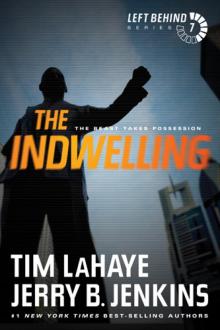 The Indwelling: The Beast Takes Possession
The Indwelling: The Beast Takes Possession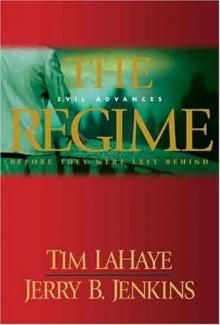 The Regime: Evil Advances
The Regime: Evil Advances The Rapture: In the Twinkling of an Eye / Countdown to the Earth's Last Days
The Rapture: In the Twinkling of an Eye / Countdown to the Earth's Last Days The Remnant: On the Brink of Armageddon
The Remnant: On the Brink of Armageddon John's Story: The Last Eyewitness
John's Story: The Last Eyewitness The Europa Conspiracy
The Europa Conspiracy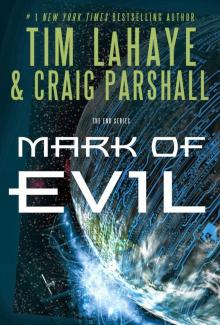 Mark of Evil
Mark of Evil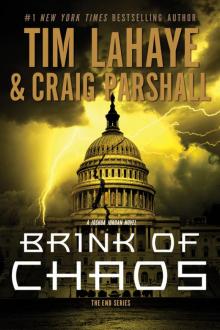 Brink of Chaos
Brink of Chaos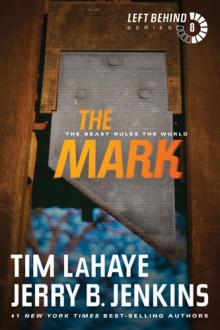 The Mark: The Beast Rules the World
The Mark: The Beast Rules the World 04 The Edge of Darkness
04 The Edge of Darkness The Rising: Antichrist is Born / Before They Were Left Behind
The Rising: Antichrist is Born / Before They Were Left Behind Babylon Rising: The Edge of Darkness
Babylon Rising: The Edge of Darkness 03 The Europa Conspiracy
03 The Europa Conspiracy Desecration
Desecration Left Behind
Left Behind The Remnant
The Remnant Soul Harvest
Soul Harvest Left Behind Book 13: Kingdom Come The Final Victory
Left Behind Book 13: Kingdom Come The Final Victory Apollyon
Apollyon 02 Thunder of Heaven: A Joshua Jordan Novel
02 Thunder of Heaven: A Joshua Jordan Novel Glorious Appearing
Glorious Appearing The Rapture: Evil Advances / Before They Were Left Behind
The Rapture: Evil Advances / Before They Were Left Behind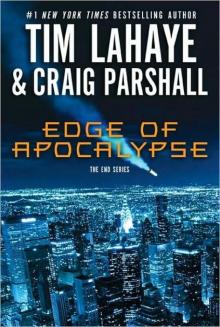 Edge of Apocalypse
Edge of Apocalypse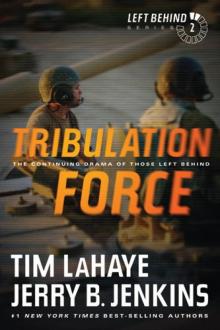 Tribulation Force
Tribulation Force The Left Behind Collection: All 12 Books
The Left Behind Collection: All 12 Books Black Friday
Black Friday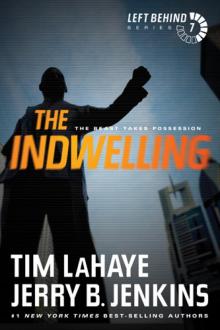 The Indwelling
The Indwelling The Left Behind Collection
The Left Behind Collection